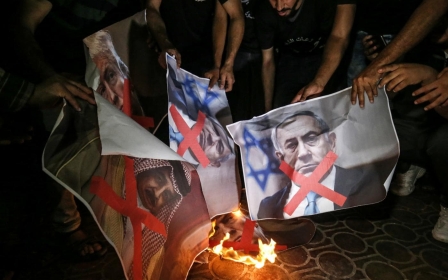'Deal of the century': Final part of the Oslo trap laid for Palestinian political elites

US President Donald Trump’s "deal of the century" tells us that only Palestinian businessmen and policemen can liberate Palestine and the Palestinians from their current tragedy.
How has the more than a century-long Palestinian struggle for liberation from Zionist settler-colonialism been transformed into a struggle to empower Palestinian businessmen and the Palestinian police who protect them and protect the Israeli occupation?
Israel's Oslo victory
The story begins in Oslo. The most important victory that Israel achieved when it signed the Oslo Accords with the Palestine Liberation Organization (PLO) in 1993 was committing the PLO to transfer all future relations with Israel to a new entity called the Palestinian National Authority (PA).
The Oslo Accords were predicated on tying a large number of West Bank and Gaza Palestinians to the Oslo process at every level
In doing so, the PLO - which represented, until then, all Palestinians in the world including those in Israel, in exile, and in the 1967 Occupied Territories - was truncated to the PA, which claims to represent just the West Bank and Gaza Palestinians (Israel refused to even allow it to include the Palestinians of East Jerusalem).
New MEE newsletter: Jerusalem Dispatch
Sign up to get the latest insights and analysis on Israel-Palestine, alongside Turkey Unpacked and other MEE newsletters
The PLO was effectively dissolved and the Palestinians were reduced by two-thirds. In return, the PLO recognised Israel’s “right to exist in peace and security”, a right, which, Israel claims, makes it the state of all Jews in the world.
Israel has tripled its Jewish population by claiming that all Jews who live outside Israel are in effect Israelis. . So as Palestinians living under one authority were reduced to a minority, Jews living in one state increased threefold.
Co-option and repression
In addition, the Oslo Accords were predicated on tying a large number of West Bank and Gaza Palestinians to the Oslo process at every level, through creating a number of classes that became inextricably financially linked to the “peace process” that Oslo inaugurated.
In this manner, it ensured that they would always have no choice but to support it. A major goal of Oslo was to demobilise the highly mobilised Palestinian population during the First Intifada by ending the revolt, partly though repression and partly through co-opting its leading activists and intellectuals into some of these classes.
These classes include:
A political elite to staff the Palestinian Authority composed mostly of PLO operatives inside and outside Palestine.
A bureaucracy to administer the population for the PA, composed of local staff and returnees.
A security force to repress Palestinian resistance to Israel and to Oslo, composed of former guerrillas-turned-mercenaries for Israel to be financed and trained mostly by the Americans and the Europeans.
Employees of non-governmental organisations (NGOs), set up by the Americans and Europeans, composed of former activists and public intellectuals who participated in the first intifada.
And a business class – both those who returned from exile to profit off their people and off the Oslo process, and those already living in the West Bank and Gaza who had been already profiting under occupation before Oslo.
As the Oslo Accords were signed at the height of the hegemony of the international neoliberal order, the purpose of facilitating profit-making for Palestinian businessmen (a number of programmes want to also “empower” Palestinian women to become entrepreneurs) and of linking the Palestinian intelligentsia to the NGOs was to ensure a relatively lean administrative staff inside the PA and an expansive security apparatus to repress any resistance to this order.
The occupation's subcontractor
As the Israelis at Oslo only promised to recognise the PLO as a representative of the Palestinians, but never promised to allow the Palestinians to establish a state of their own, or to withdraw from the occupied territories, or to cease building more settlements, let alone to dismantle the existing ones, or to grant the Palestinians self-determination, the role of the PA was only as a subcontractor of the occupation charged with ending the intifada and repressing any future manifestation of resistance to the Israelis.
Though the political class continued to harbour illusions that they would be granted at least a Bantustan state that they could pretend was a real one and maintain whatever authority Israel would allow them to keep, the Israelis had no intention of ever granting them such an entity.
The role of the PA was only as a subcontractor of the occupation charged with ending the intifada and repressing resistance to the Israelis
Having served its purpose as a transitional authority to help Israel repress the Palestinian people through its security coordination - a central PA function which Mahmoud Abbas called “sacred” - Israel and Trump now feel that the PA has exhausted its role and has become superfluous.
Enter the “deal of the century.” The “deal” has only one role for the PA, which is the same role Oslo endowed the PLO, namely that the PA should accept the “deal” and hand over its authority to Palestinian (and other Arab and international) businessmen (less so women), dissolve its political class, and hand over all local authority to its security apparatus.
The goal of the Deal, like the Oslo Accords of which it is the final phase, is that all the Palestinian people everywhere need is businessmen and policemen and not the end of Israeli settler-colonialism and occupation.
Security coordination
The PA security apparatus that has killed and imprisoned Palestinians since 1994 is highly trained and praised by the Americans. In November 1994, soon after entering Gaza, Arafat’s police killed at least 13 unarmed Palestinians and wounded 200 in Gaza for daring to demonstrate against the Oslo Accords.
During his visit to Gaza in early 1995, then US Vice-President Al Gore praised Arafat for setting up military tribunals to try those Palestinians opposed to Oslo.
While the CIA helped train the PA security forces in covert operations initially, the US would later come out openly as in charge of training them.
Lieutenant General Keith Dayton, who served as the US security coordinator for the PA from December 2005 to October 2010, oversaw their training and the coup they staged against the democratically elected Hamas in 2007 – a coup that failed in Gaza and was successful in the West Bank.
Before coming to the West Bank, Dayton was busy fighting America’s war against the Iraqi people in 2003. He was succeeded by Lt General Michael Moeller, who served until 2012 and was followed by the current overseer, Vice Admiral Paul Bushong.
The European Union in turn has been financing and training PA police for the same tasks through their EU Police Coordinating Office for Palestinian Police Support or EUPOL COPPS since 2006.
The PA security police has been a major Israeli success and is duly credited by the Israelis for continuously preventing the majority of Palestinian resistance operations against the occupation army.
Business as usual
As for the business class, which was instrumental is convincing Arafat in 1993 to sign Oslo, they continue to coordinate their business activities with the Israelis.
While businessmen and pro-business intellectuals promised the Palestinian people that the peace process would transform the occupied Territories into Singapore, now it is Jared Kushner who is making similar promises with his “deal".
Indeed, amidst the preparations for the Deal of the Century’s Bahrain conference, it was revealed last week by the Israeli online news outlet Walla, that Israeli Army Chief of General Staff Lieutenant General Aviv Kochavi met with one Palestinian millionaire two months ago in Ramallah to discuss the current economic situation in the West Bank.
A Palestinian billionaire with multiple businesses in the Occupied Territories was celebrated by the Israelis as “the Rothschild” of the Palestinians.
No heroic act
The PA’s refusal to attend the Bahrain conference a couple of weeks ago was not a heroic act, but rather one of self-preservation. Knowing that the goal of the “deal of the century” is to force the PA political class to dissolve itself, the PA chose not to attend.
While a few Palestinian businessmen attended the Bahrain conference (only one of them, Salah Abu Mayyala, was arrested by PA security after returning to the West Bank but was later released), the rest of them stayed away from Bahrain in a show of solidarity with the political class.
Nonetheless, the PA knows very well that if the Americans and Israelis succeed in imposing the deal, Palestinian businessmen and the Palestinian security apparatus would most likely sacrifice the PA political class and proceed to “liberate” Palestine with more profits in their coffers and more repression for the rest of the Palestinian people.
The views expressed in this article belong to the author and do not necessarily reflect the editorial policy of Middle East Eye.
Middle East Eye delivers independent and unrivalled coverage and analysis of the Middle East, North Africa and beyond. To learn more about republishing this content and the associated fees, please fill out this form. More about MEE can be found here.










